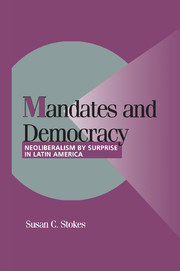Book contents
- Frontmatter
- Contents
- Preface
- 1 ELECTIONS, MANDATES, AND REPRESENTATION
- 2 ELECTIONS AND ECONOMIC POLICY IN LATIN AMERICA
- 3 EXPLAINING POLICY SWITCHES
- 4 ARE PARTIES WHAT'S WRONG WITH DEMOCRACY IN LATIN AMERICA?
- 5 NEOLIBERALISM WITHOUT MANDATES: CITIZENS RESPOND
- 6 MANDATES AND DEMOCRATIC THEORY
- 7 SUMMARY, PREDICTIONS, UNSETTLED QUESTIONS
- References
- Author Index
- Subject Index
- Titles in the series
2 - ELECTIONS AND ECONOMIC POLICY IN LATIN AMERICA
Published online by Cambridge University Press: 10 December 2009
- Frontmatter
- Contents
- Preface
- 1 ELECTIONS, MANDATES, AND REPRESENTATION
- 2 ELECTIONS AND ECONOMIC POLICY IN LATIN AMERICA
- 3 EXPLAINING POLICY SWITCHES
- 4 ARE PARTIES WHAT'S WRONG WITH DEMOCRACY IN LATIN AMERICA?
- 5 NEOLIBERALISM WITHOUT MANDATES: CITIZENS RESPOND
- 6 MANDATES AND DEMOCRATIC THEORY
- 7 SUMMARY, PREDICTIONS, UNSETTLED QUESTIONS
- References
- Author Index
- Subject Index
- Titles in the series
Summary
The last two decades of the twentieth century were the era of new democracies and new market economies. But democracy was not always the road to the market. It was not if by democracy we have in mind government by popular will. Nowhere did the tension between the people's will and market transformation rise to the surface more frequently than in Latin America. Some politicians, it is true, won elections after campaigning in favor of efficiency-oriented policies – reducing the size of the state, privatizing state-owned enterprises, and opening trade – and once in office actively pursued this agenda. Other politicians won after campaigning in favor of security-oriented policies – job creation, industrial policy, and a gradualist approach to inflation stabilization – and once in office carried out these policies. Still a third set of politicians won after making only the vaguest of campaign pronouncements, ones from which even the most attentive voters would garner little about the policies the candidate would pursue in office. Finally, a sizable minority of Latin American presidents ran for office pronouncing themselves in favor of security-oriented policies, only to switch to an efficiency-oriented agenda once in office.
The reaction of citizens to liberalization, preannounced or not, also varied. Some governments that embarked on pro-market reforms went down to defeat, whether by impeachment or at the ballot box. Public opinion deemed others a success. Paradoxically, two politicians who had campaigned most strenuously in favor of security-oriented policies and switched to radical efficiency programs were by the end of their first term among the most popular on the continent, rewrote their constitutions so that they could run for reelection at the end of the term, ran, and won.
- Type
- Chapter
- Information
- Mandates and DemocracyNeoliberalism by Surprise in Latin America, pp. 25 - 59Publisher: Cambridge University PressPrint publication year: 2001



